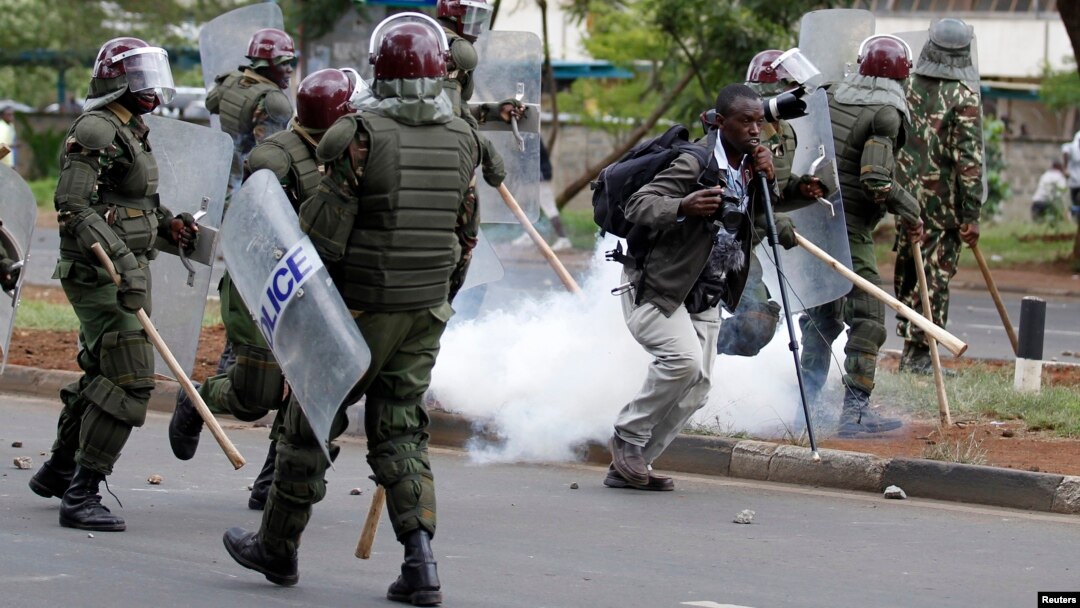NAIROBI —
Political tensions are once again on the rise in Kenya, as the opposition demands the government do more to address growing insecurity and economic problems. Ongoing tensions make clear political differences that almost tore apart the country seven years ago have not yet been resolved.
Speaking to more than 100,000 supporters Saturday, former prime minister Raila Odinga and other opposition leaders called on the government to convene a national forum to discuss Kenya's worsening security, economic and political situation.
The opposition warned that unless government heeds the call, it should prepare for demonstrations across the country.
In response, President Uhuru Kenyatta agreed to dialogue but ruled out sharing power with the opposition.
Some lawmakers allied with the government advised the opposition to use constitutional means to address the challenges facing the country.
The chairman of the Political Parties Collaborative Forum, Colonel Mwema, says the ruling party holds a majority in both houses of parliament. But he warns the party must listen to its critics.
“When you are in the government you are comfortable. You have no problems, but other people outside the government have problems that are valid," he said. "And these problems are pushing everybody to a corner, and if they are not addressed, they will cause political instability in the country in the future.”
Mwema also says failure to address pressing issues like insecurity, corruption, and the high cost of basic commodities could result in unrest and disorder.
In the last few years, Kenya has made progress in building credible government institutions, to avoid a replay of the deadly post-election violence six years ago. That violence, largely along ethnic lines, left more than 1,100 people dead and displaced hundreds of thousands of Kenyans.
The violence subsided only after the international community sent former United Nations chief Kofi Annan to broker a political deal between Odinga and then-President Mwai Kibaki.
This time around, Mwema says, the country has the capacity to solve a political crisis - as long as the political will is there.
“Actually, as a country we have the capacity to do it without any outside assistance," he said. "We can do it. If there is political good will, it can happen, but if there is no political goodwill then it means we will have to go out and look for someone who we think is neutral and can put us together.”
Kenyatta and his deputy, William Ruto, both face charges by the International Criminal Court, which contends they helped to orchestrate the violence in 2008.
Ruto's trial began last year. Kenyatta's trial has been repeatedly postponed.
Speaking to more than 100,000 supporters Saturday, former prime minister Raila Odinga and other opposition leaders called on the government to convene a national forum to discuss Kenya's worsening security, economic and political situation.
The opposition warned that unless government heeds the call, it should prepare for demonstrations across the country.
In response, President Uhuru Kenyatta agreed to dialogue but ruled out sharing power with the opposition.
Some lawmakers allied with the government advised the opposition to use constitutional means to address the challenges facing the country.
The chairman of the Political Parties Collaborative Forum, Colonel Mwema, says the ruling party holds a majority in both houses of parliament. But he warns the party must listen to its critics.
“When you are in the government you are comfortable. You have no problems, but other people outside the government have problems that are valid," he said. "And these problems are pushing everybody to a corner, and if they are not addressed, they will cause political instability in the country in the future.”
Mwema also says failure to address pressing issues like insecurity, corruption, and the high cost of basic commodities could result in unrest and disorder.
In the last few years, Kenya has made progress in building credible government institutions, to avoid a replay of the deadly post-election violence six years ago. That violence, largely along ethnic lines, left more than 1,100 people dead and displaced hundreds of thousands of Kenyans.
The violence subsided only after the international community sent former United Nations chief Kofi Annan to broker a political deal between Odinga and then-President Mwai Kibaki.
This time around, Mwema says, the country has the capacity to solve a political crisis - as long as the political will is there.
“Actually, as a country we have the capacity to do it without any outside assistance," he said. "We can do it. If there is political good will, it can happen, but if there is no political goodwill then it means we will have to go out and look for someone who we think is neutral and can put us together.”
Kenyatta and his deputy, William Ruto, both face charges by the International Criminal Court, which contends they helped to orchestrate the violence in 2008.
Ruto's trial began last year. Kenyatta's trial has been repeatedly postponed.


